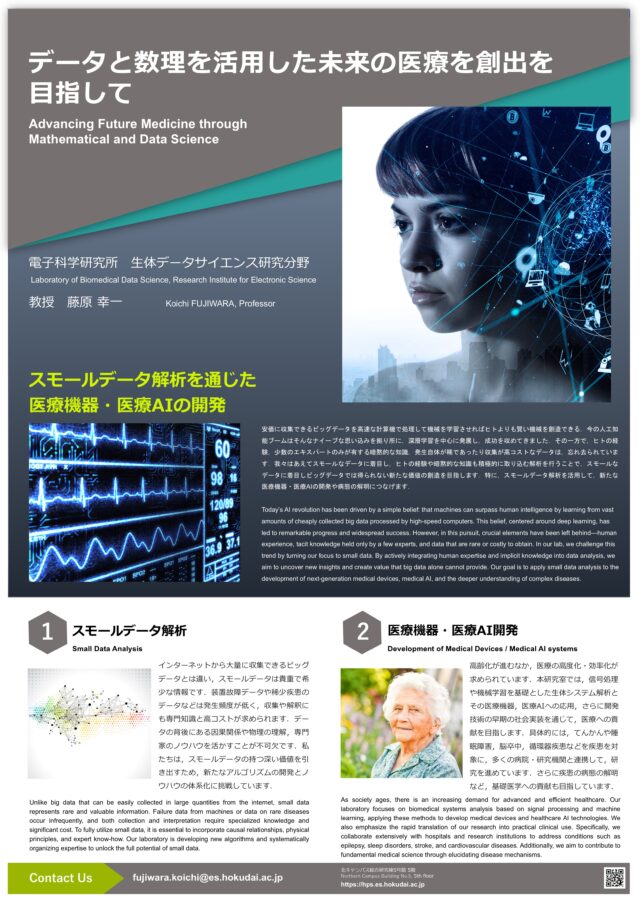Laboratory of Biomedical Data Science
- Research Theme
- Machine Learning / Biosignal Processing / Medical Device and Medical AI Development
- Research Keywords
Machine Learning, Biosignal Processing, Medical AI, Neuroscience, Psychiatry, Sleep Medicine, Pediatrics, Anesthesiology, Veterinary Medicine, Human-Machine Interface
Staff
Overview of Research and Education
The current boom in artificial intelligence has largely been driven by a naïve belief: that if we process cheaply collected big data using high-speed computers, we can create machines smarter than humans. This belief has fueled the rise of deep learning. However, in this pursuit, we have overlooked the value of human experience, the implicit knowledge possessed by only a few experts, and data that are either rare in occurrence or expensive to collect.
In contrast, our research deliberately focuses on small data. By actively incorporating human experience and tacit knowledge into our analyses, we aim to create new value that big data alone cannot offer. Specifically, we seek to develop novel medical AI systems and devices by integrating small data with expert insights and field knowledge.
Moreover, our work involves advancing methodologies for small data analysis, developing new machine learning algorithms and mathematical models, and contributing to foundational medical and neuroscience research through the lens of real-world data.
Laboratory of Biomedical Data Science (pdf)
Practical Subjects
Charge
- Charge (US):
School of Science, Biological Science course (Macromolecular Functions), Collaborative Laboratories - Charge (GS):
Graduate School of Life Science, Division of Life Science, Transdisciplinary Life Science Course, Biomaterials Science
Contact
- Address
- 〒001-0020
5F, Northern Campus Building No.5
N20W10, Kita-Ward Sapporo 001-0020 JAPAN
- fujiwara.koichi*es.hokudai.ac.jp(Please replace*with @ when sending e-mail.)
Representative Publications
K. Fujiwara, T. Kawaji, S. Saeda, T. Yamakawa, M. Kato, T. Aizawa, T. Yokomatsu, S. Miki: IoT-based atrial fibrillation screening system, development and prospective study, IEEE Internet of Things Journal, DOI: 10.1109/JIOT.2025.3537636 (In press)
S. Date, Y. Sumi, K. Fujiwara, M. Imai, K. Ogawa, H. Kadotani: Polysomnographic features prior to dream enactment behaviors in isolated rapid eye movement sleep behavior disorder, Clinical Neurophysiology, 166, 74-84 (2024)
K. Fujiwara, H. Iwamoto, K. Hori, M. Manabu: Driver Drowsiness Detection Using R-R Interval of Electrocardiogram and Self-Attention Autoencoder, IEEE Transactions on Intelligent Vehicles, 9(1), 2956 – 2965 (2024)
K. Ota, K. Fujiwara, T. Hiraoka: Frustration Control during Driving Using Auditory False Heart Rate Feedback for Road Rage Prevention, Transportation Research Part F: Psychology and Behaviour, 101, 375-386 (2024)
T. Nakanishi, T. Tsuji, Y. Sento, H. Hashimoto, K. Fujiwara, K. Sobue: Association between post-induction hypotension and postoperative mortality: A single-center retrospective cohort study, Canadian Journal of Anesthesia, 71, 343–352 (2024)
K. Fujiwara, K. Ota, S. Saeda T. Yamakawa, T. Kubo, A. Yamamoto, Y. Maruno, M. Kano: Heat Illness Detection with Heart Rate Variability Analysis and Anomaly Detection Algorithm, Biomedical Signal Processing and Control, 87, part A, 105520 (2023)
S. Ogawa, K. Fujiwara, M. Kano: Auditory Feedback of False Heart Rate for Video Game Experience Improvement, IEEE Transactions on Affective Computing, 14(1), 487 – 497 (2023)
T. Uchida, K. Fujiwara, K. Nishioji, M. Kobayashi, M. Kano, Y. Itoh, H. Kadotani: Medical Checkup Data Analysis Method Based on LiNGAM and Its Application to Nonalcoholic Fatty Liver Disease, Artificial Intelligence In Medicine, 128, 102310 (2022)
A. Iwasaki, K. Fujiwara, C. Nakayama, Y. Sumi, M. Kano, T. Nagamoto, K. Iseki, H. Namakura, H. Kadotani: Validation of R-R interval and neural network-based sleep apnea screening method with large clinical polysomnography dataset, Clinical Neurophysiology, 139, 80-89 (2022)
